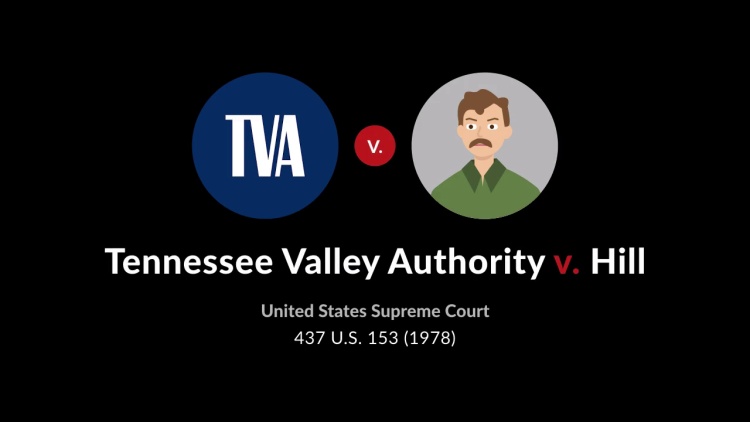Tennessee Valley Authority v. Hill
United States Supreme Court
437 U.S. 153 (1978)
- Written by Craig Conway, LLM
Facts
Hill and other Tennessee residents (the residents) (plaintiffs) filed suit in federal district court against the Tennessee Valley Authority (TVA) (defendant), a wholly owned public corporation of the United States, seeking to enjoin construction of a nearly completed dam and reservoir on the Little Tennessee River. The residents alleged the project failed to conform to the requirements of the National Environmental Policy Act. The district court granted the residents’ request and halted the project pending the filing of an environmental-impact statement. Several months later, a University of Tennessee scientist discovered a previously unknown species of perch, called the snail darter, living in the waters affected by the project. Pursuant to the Endangered Species Act (ESA), the secretary of the interior found that once the dam and reservoir were operational, it would result in the “total destruction of the snail darter’s habitat.” The secretary listed the snail darter on the endangered-species list and declared that, under § 7 of the ESA, all federal agencies were required to protect the snail darter’s critical habitat area. The residents then filed suit against the TVA to enjoin the final completion of the dam and reservoir on the ground that it could result in the extinction of the snail darter. The district court denied the residents’ request for injunction and dismissed the complaint. The residents appealed. The court of appeals reversed and remanded the case with instructions that a permanent injunction be issued. The United States Supreme Court granted certiorari to review.
Rule of Law
Issue
Holding and Reasoning (Burger, C.J.)
Dissent (Powell, J.)
What to do next…
Here's why 905,000 law students have relied on our case briefs:
- Written by law professors and practitioners, not other law students. 47,100 briefs, keyed to 995 casebooks. Top-notch customer support.
- The right amount of information, includes the facts, issues, rule of law, holding and reasoning, and any concurrences and dissents.
- Access in your classes, works on your mobile and tablet. Massive library of related video lessons and high quality multiple-choice questions.
- Easy to use, uniform format for every case brief. Written in plain English, not in legalese. Our briefs summarize and simplify; they don’t just repeat the court’s language.





